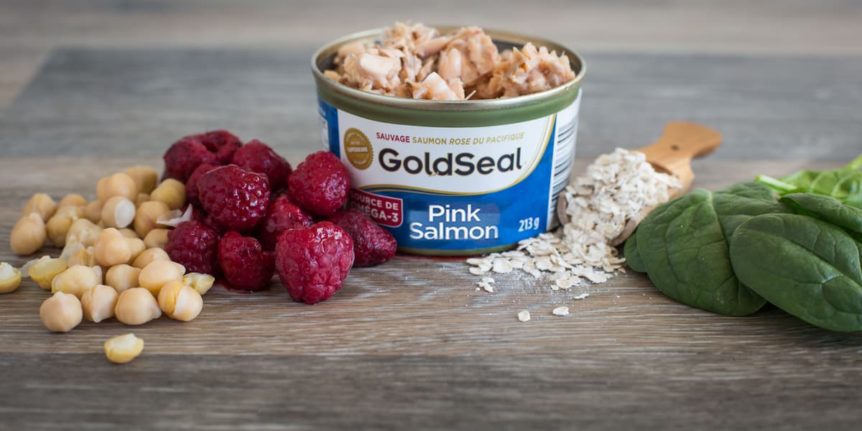February is National Heart Month, and not just because of Valentine’s Day! Prevention is key when it comes to keeping your heart healthy. According to the Heart and Stroke Foundation of Canada close to 80% of premature heart disease and stroke can be prevented through lifestyle, including eating a well-balanced diet. So, what makes a food heart healthy? To keep your ticker in top shape, focus on balance and variety. If you are looking for some delicious foods to add in to your routine that support heart health, check out our list below!
Oats and Other Whole Grains
- Oats (or oatmeal) are known as being a good source of soluble fibre. When you think about oats, they swell and hold water. This is because of the soluble fibre content! This type of fibre has been linked to a reduction in LDL (“lousy”) cholesterol, which supports your overall heart health.
- Whole grains truly contain the entire grain: the bran, germ and endosperm. In general, whole grains contain more fibre and nutrients, making them an awesome addition to your eating routine. Aside from the nutritive benefits, whole grains also add more flavour and texture to your meal!
Ways to enjoy whole grains: try overnight oats for breakfast, add oats into homemade muffins, or make your own granola.
Salmon and Other Fatty Fish
- Fatty fish are one of the highest and most bioavailable sources of omega-3 fatty acids. Fatty fish contain two types of omega-3 fats, known as EPA and DHA. Including adequate amounts in your diet helps to reduce inflammation in the body and may help to reduce the risk of developing heart disease.
- In order to maximize your omega-3 consumption, include fatty fish in your diet two or three times per week. Depending on where you live, it may be difficult to find good quality fish. If necessary, take a high quality omega-3 supplement that contains EPA and DHA. For those with a fish allergy, you can find vegetarian omega-3 supplements made from algae!
Ways to enjoy fatty fish: use canned salmon to make salmon patties, grill fresh salmon on the BBQ, or add leftover baked salmon to a salad.
Chickpeas and Other Pulses
- Pulses include peas, beans, chickpeas and lentils. They are an excellent source of fibre, complex carbohydrates and plant-based protein. They are also packed with nutrients like iron, folate and potassium! Chickpeas alone contain almost 18 grams of fibre per 1/2 cup serving. The high fibre content has been proven to help prevent and manage chronic conditions like heart disease!
- Pulses are inexpensive, versatile and contribute to sustainable agriculture as they use less water than many other crops, making them wonderful all-around. If purchasing the canned variety, ensure that you are buying the “no salt added” variety or rinse them before using!
Ways to enjoy pulses: incorporate them into soups, use roasted chickpeas as croutons on salad, or incorporate them into baking in their mashed or flour form.
Raspberries and Other Berries (Strawberries, Blueberries, Blackberries)
- In general, including fruits and veggies helps to ensure your heart is healthy. Berries are one of the most enjoyed fruit options out there! They are a fantastic source of fibre, nutrients and antioxidants. In particular, raspberries are a great source of soluble fibre, which is linked to a reduction in LDL cholesterol. Berries are also a source of polyphenols, which may play a role in keeping your heart healthy, but more evidence is needed to support this.
Ways to enjoy berries: Throw berries into a salad, mix into Greek yogurt for a snack, or add to your oatmeal at breakfast.
Spinach and Other Leafy Greens
- Spinach and other dark leafy greens are a good source of potassium. Current evidence supports the idea that higher potassium intake may help to reduce blood pressure, which is an important factor when it comes to maintaining your heart health!
- Overall, to increase your intake of potassium, focus on including fruits, vegetables, pulses, nuts and seeds.
Ways to enjoy leafy greens: Add leafy greens to a soup or stew, throw a handful in to a smoothie, or mix into an omelette.
References
Alexander, D., Miller, P., Van Elswyk, M., Kuratko, C., & Bylsma, L. (2017). A Meta-Analysis of Randomized Controlled Trials and Prospective Cohort Studies of Eicosapentaenoic and Docosahexaenoic Long-Chain Omega-3 Fatty Acids and Coronary Heart Disease Risk. Mayo Clinic Proceedings, 92(1), 15-29. doi:10.1016/j.mayocp.2016.10.018
Amiot, M., Riva, C., & Vinet, A. (2016). Effects of dietary polyphenols on metabolic syndrome features in humans: a systematic review. Obesity Reviews, 17(7), 573-586. doi:10.1111/obr.12409
Binia, A., Jaeger, J., Hu, Y., Singh, A., & Zimmermann, D. (2015). Daily potassium intake and sodium-to-potassium ratio in the reduction of blood pressure: a meta-analysis. Journal Of Hypertension, 33(8), 1509-1520. doi:10.1097/hjh.0000000000000611
de Souza, R., Mente, A., Maroleanu, A., Cozma, A., Ha, V., & Kishibe, T. et al. (2015). Intake of saturated and trans unsaturated fatty acids and risk of all cause mortality, cardiovascular disease, and type 2 diabetes: systematic review and meta-analysis of observational studies. BMJ, h3978. doi:10.1136/bmj.h3978
Leslie, M., Cohen, D., Liddle, D., Robinson, L., & Ma, D. (2015). A review of the effect of omega-3 polyunsaturated fatty acids on blood triacylglycerol levels in normolipidemic and borderline hyperlipidemic individuals. Lipids In Health And Disease, 14(1). doi:10.1186/s12944-015-0049-7
Nettleton, J., Lovegrove, J., Mensink, R., & Schwab, U. (2016). Dietary Fatty Acids: Is it Time to Change the Recommendations?. Annals Of Nutrition And Metabolism, 68(4), 249-257. doi:10.1159/000446865
Suen, J., Thomas, J., Kranz, A., Vun, S., & Miller, M. (2016). Effect of Flavonoids on Oxidative Stress and Inflammation in Adults at Risk of Cardiovascular Disease: A Systematic Review. Healthcare, 4(3), 69. doi:10.3390/healthcare4030069
Whitehead, A., Beck, E., Tosh, S., & Wolever, T. (2014). Cholesterol-lowering effects of oat -glucan: a meta-analysis of randomized controlled trials. American Journal Of Clinical Nutrition, 100(6), 1413-1421. doi:10.3945/ajcn.114.086108



